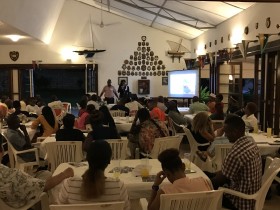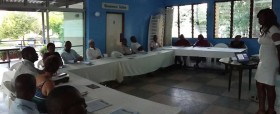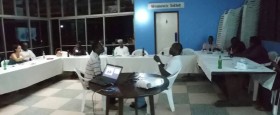Today’s Blog post was brought you by Pauline Diaz, Hatua Likoni’s Tertiary Programming Consultant
If you follow Hatua’s adventures, you couldn’t have missed the very successful networking event we held in April at the Yacht Club Mombasa where more than 60 people gathered to be introduced to the 2.0 version of our mentoring program. Our current mentors, potential new ones, guests, students, alumni, family and friends showed their enthusiasm for and commitment to Hatua’s values and future projects. We all spent a casual but wonderful after work sharing our experiences and learning about Hatua.

Exchanging about the program was a great first step and everyone was able to grasp what new directions Hatua was taking to strengthen its program. However, after the event it was time to move forward with the next steps and take concrete actions to make the new mentor program a reality. Throughout our pool of new interested business professionals, we had already identified some possible matches with our students, always pairing couples with the same gender and the same background. They would be the first chosen for our training.

On Tuesday 6th of June, Hatua organized its first mentor orientation training held at the Mission Seamen Mombasa. For two hours, twelve mentors learned, exchanged, and brainstormed on various questions and concerns they might have had about becoming mentors. Indeed, being a mentor is not necessarily something everyone is born with; like for every manager, leadership qualities and communication skills can be acquired with coaching and experience. Our training aimed at giving these professionals all the tools they needed to succeed in their first steps as mentors. Questions like “what am I going to talk about with my mentee during our first meeting” or “how can I help my mentee find a job?” were answered by simple tasks checklists and communication tips. They also had the chance to practice some of these advices during a few to role-play. Divided in pairs, they were able to act out scenarios in front of everyone trying to solve different issues that might arise in their relationship with a young adult.

The most enjoyable for us was to listen to the comments and participate in debates about what the mentor relationship should be and what it meant to them. Of course, there was no right answer to that. There are different types of mentors in the world, but truly wanting to become a better person and taking a younger one with you along that same journey is the most important. Everyone can learn technical skills on how to become a mentor; however, it is harder to learn honesty, trust, or integrity; values that are part of somebody’s personality and that all our future mentors agreed upon as essential qualities to succeed in this program. By seeing their commitment and motivation to challenge themselves and learn new concepts, the Hatua team has no doubts in everyone’s ability to become exceptional role models.
We cannot wait to see where these relationships will take our students, and we feel blessed with the people that were put on our path, and that we can now consider as part of the Hatua’s family.